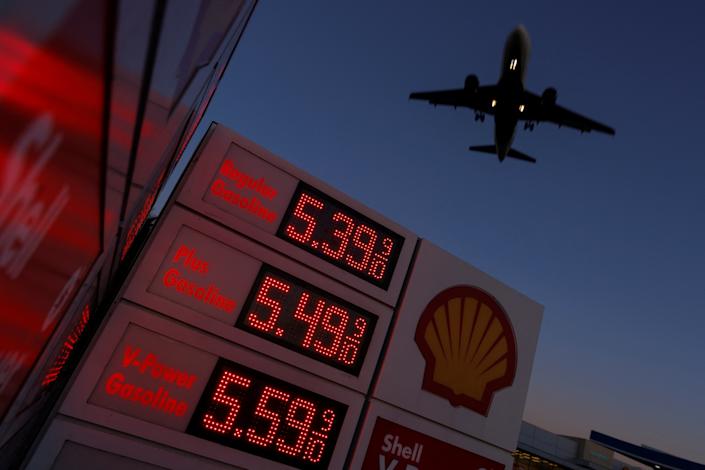Russia’s barbarian invasion of Ukraine is a human rights atrocity, but a few things are going right. The sanctions imposed by the United States, Europe, Japan and other nations probably won’t stop the tanks, but they’re hammering the Russian economy and forcing the aggressor nation to pay a price for its medieval behavior.
President Biden has said the goal of sanctions is “to maximize the long-term impact on Russia and to minimize the impact on the United States and our allies.” So far, that is what’s happening. Russia’s ruble has collapsed and the Russian stock market is down more than 70% for the year. That’s more carnage than the financial crash of 2008 caused at the worst moment of the crisis. Severing many Russian financial institutions—including Russia’s central bank—from global networks will prevent the kind of emergency measures the Federal Reserve would typically use to head off a crash. Winter is coming to the Russian economy.
The biggest risk to the US
The biggest risk to U.S. and other financial markets is that one of two things will happen next: Either Russia will withhold energy shipments as a countermeasure to sanctions, or Europe will boycott Russian energy supplies. Either scenario would remove a significant amount of oil and natural gas from global markets and send prices soaring. That in turn would worsen inflation that’s already 7.5% in the United States and strain producers heavily dependent on energy.
The sanctions are designed to avoid these types of disruptions. While they sharply constrain several Russian banks, for instance, they exempt one that provides financing for Gazprom, the huge Russian gas supplier. And so far, there’s been no major impact on the actual supply of energy coming from Russia. That’s why financial markets outside of Russia have been relatively stable, even as Russian forces creep closer to Ukraine’s capital of Kyiv.
[Get Rick Newman’s stories by email or follow him on Twitter.]
“What has happened so far is very bad for Russia and Ukraine,” economist Jonas Goltermann of Capital Economics said during a call for clients on Feb. 28. “So far, what has happened is not all that dramatic for the rest of the world in economic terms.”
Minimal impact on the U.S. economy is different from no impact, however, and American consumers are going to feel some impact from the Ukraine war in coming weeks. The most obvious will be a rise in gas prices. Oil prices have risen nearly $30 per barrel since Russia’s menacing of Ukraine became a shooting war, to $106 per barrel in U.S. markets. That’s not because oil has become more scarce, but because the risk of disruptions related to Russian supply is now much higher than before.
That could push average U.S. pump prices above $4 per gallon. Gas prices started the year at around $3.30 and they’re around $3.60 now. Gas prices normally follow oil prices higher, and there’s no reason it will be different this time. Four-dollar gas represents a pain threshold for many drivers, if only because gas prices are so widely advertised and they disproportionately affect consumer psyches.
Many voters blame Biden for the surprise burst of inflation, but $4 gas will arrive courtesy of Russia’s disregard for civilized norms rather than any Biden policy or regulatory move. Biden would clearly lower gas prices if he could, and he has tried. Biden ordered the release of 50 million barrels of crude from U.S. reserves last November, and the U.S. and other nations have now said they’ll release 60 million barrels of oil, to help counter rising prices. While 60 million barrels might sound like a lot, it’s less than one day’s worth of global consumption, so the impact on prices may be limited.
Nobody enjoys watching the numbers soar as gas flows into their vehicle’s tank. Yet there’s widespread horror as disbelieving billions watch Russia savage Ukraine, and polls show Americans strongly support sanctions. Those sanctions entail some sacrifice outside of central Europe, in the form of higher gas prices, at least for a while. Americans who want to support Ukraine don’t have to like higher prices, but they can fill up knowing there’s a good cause on the other side of the world. At least the sacrifice doesn’t involve missiles and explosions.
Biden can’t do much to influence gas prices, but one world leader can: Russian President Vladimir Putin. If Putin would back down or agree to some sort of truce, oil and gas prices would plunge and investors everywhere would exhale. That’s not Putin’s MO, however, and he seems inclined to continue wreaking havoc, hoping his opponents’ ability to bear even a little pain will wither before his own people’s ability to bear a lot. The West can choose to prove him wrong.
Rick Newman is a columnist and author of four books, including “Rebounders: How Winners Pivot from Setback to Success.” Follow him on Twitter: @rickjnewman. You can also send confidential tips.
Follow Yahoo Finance on Twitter, Instagram, YouTube, Facebook, Flipboard, and LinkedIn




